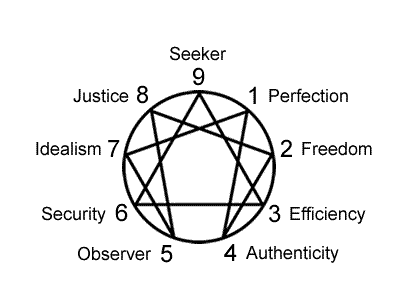Enneagram Traps: Nine traps that keep us stuck in ego

Not often mentioned with the Enneagram personality types, the traps are another way to understand the fixations of the types.
The Enneagram ego traps originated with Oscar Ichazo's ego-types and refer to the habit of being that perpetuates ego fixation.
They represent how an individual of a given Enneagram type remains stuck in a particular fixation by thinking the trap is the way out when in fact it just reinforces and perpetuates that preoccupation of mind.
The traps are the false remedy for the fixation. Ichazo called the true remedy for the fixation the holy idea. By seeing through the falseness of the trap one begins to gain awareness of the holy idea instead.
Ichazo's original ego traps
Taken from the book Transpersonal Psychologies edited by Charles T. Tart, the descriptions of the ego traps below come from John C. Lilly and Joseph E. Hart who attended the 1970 Arica retreat with Oscar Ichazo.
- Perfection - While demanding perfection of himself he also expects perfection in others. Of course he always hates himself for not being perfect, and is always disappointed in others.
- Freedom - Although dependent upon others for constant approval of himself and his actions, he is fighting that dependency in order to be free from social disapproval and approval.
- Efficiency - He has little patience with inefficiency in others, is looking for more effective and quicker methods of achieving his goals. Thus he may be rather inefficient himself.
- Authenticity - For this person, the really real mate will always be just around the corner of the next hour or day, or year. With such a mate, this person will then be fulfilled and so authentic.
- Observer - For him life is fascinating to watch from a safe hidden place, but is much too terrifying to take part in.
- Security - Since such a person lives in fear—life is always threatening—he always seeks something or someone as protector against impending disaster. He will seek to build up a solid fortune or will become the devoted follower of a strong leader.
- Idealism - He is concerned with manipulating the present so that the future will be perfect and the fulfillment of his ideals. When the future becomes the present, he is disappointed and must begin working again toward his ideal.
- Justice - Being aware of living in a very injust world, he is very sensitive to any unfair actions or thoughts directed at him. His immediate response is that of revenge.
- Seeker - He is always seeking outside himself for the solution of his problems, running from guru to guru.
The traps and the personality types
While the Enneagram traps are not often explicitly mentioned with today's Enneagram personality types, they can be implicitly found in the descriptions and even the labels of the types (e.g., type 1 the perfectionist, type 5 the observer).
Because the personality types evolved beyond the ego-types the original descriptions of the traps may or may not match the descriptions below (which are reinterpretations more fitting for today's personality types).
Type 1: Perfection comes from striving to attain or model an ideal that is free from flaws or criticism.
Type 2: Freedom comes from being attentive to the needs and desires of others so they'll take care of yours.
Type 3: Efficiency comes from pursuing the most effective path forward toward achieving your set goal.
Type 4: Authenticity comes from finding a sense of self and significance that expresses your unique gifts and individuality.
Type 5: An observer stands back from the world in order to better understand it before participating in it.
Type 6: Security requires constant scanning for potential dangers and problems in order to be prepared.
Type 7: Idealism that is enthused about what's possible but moves on to what's next when the enthusiasm wanes.
Type 8: Justice pushes to reveal hidden truths that you imagine others to be hiding beneath the surface.
Type 9: A seeker of harmony and belonging that accommodates by going along with others and not rocking the boat.
Click here for the Complete Guide to the Enneagram.
This free guide explains- the nine Enneagram personality types
- the many type variations within type
- where the types came from (origins and history)
- how the types use the Enneagram symbol
Click here for Enneagram tests.
These free tests help you find your- primary type
- candidate types
- preferred wing
- intinctual subtype
- instinctual variant stacking
- center types (gut, heart, and head)
- tri-center with wings